"We take our role in Serbia seriously"
Thursday, 05.02.2009.
18:27

"We take our role in Serbia seriously" B92: At the beginning of this conversation I would like to invite you to help clarify a dilemma that exists among some political leaders and citizens of Serbia. Is it true that you belong to the group of ambassadors who influence the work of the Serbian government? Munter: Absolutely. I do my best, I try to be as honest and straightforward with the leaders of this country as I can be. One thing I also try to do is to share with them some of my impressions that I get from people outside the government. I spend a lot of time with mayors, I spend a lot of time with businesspeople, and I hope that’s a contribution too, whether its influencing or helping, I certainly am in touch with them, and I’m very open and honest whenever I can be. B92: You are aware of criticism that says that you are actually crossing the line and stepping out from your mandate as a foreign diplomat here, and that you are interfering a bit too much? Munter: What am I doing that is wrong? B92: The rumor had it that you contributed in forming the government, and that today the decisions are taken after consulting you – and I’m sure that you are aware of the media report on that, and the politician who is the most vocal about criticizing you is former prime minister, Mr. Kostunica. Munter: Well as you know I’ve had some differences in the past with Minister Kostunica and I think honest differences, and when he was the minister I was very vocal and frank with him about it. I’m just as straightforward with the government here about what I think is going on, what I think are the main issues, but I think it would be wrong to assume that the government does what it does because of me. B92: But how do you explain that it was you who was singled out, not other ambassadors, as the most powerful ambassador in Serbia? Munter: Well, first of all I would like to think that it's flattering, that I’m a nice guy and that people are thinking that I’m someone who it's fun to talk to. But in all seriousness, I think the American role here is an important role, it’s a serious role, one that we really take seriously. We’re committed to the future of this country, we have a large assistance program, we have good ties in the military, good ties in intelligence, we have good ties politically to the leadership here and so what I think is perhaps people are at a certain level that we really are committed to your future and they may think that that somehow has something to do with my personality. B92: You said the other day that the cooperation with the current government is good, that there almost are no problems, except the totally different views on the Kosovo issue. Having in mind that Kosovo and resolving the Kosovo issue is one of the key priorities for the current government of Serbia, don’t you think that you’re undermined a little bit, that area where the dispute is really profound? Munter: Lets be very honest, there is a dispute, there is a different interpretation about Kosovo. My comments recently about the multifaceted and the broad nature of our relationship were focused on the fact that we spend a lot of time and a lot of money on building the future of Serbia, at least as best we can contribute with the help of the government and with the help of non-government actors like NGOs, or even the media, we hope. And what we try to do is to define our relationship with Serbia along the lines of where does Serbia want to go, how do we want to help them do that. You’re right though, in saying that the relationship about Kosovo, about which we disagree, is very important. It’s a real stumbling block. What we try to do is be as honest as we can about it to try to figure out those ways even if we disagree about Kosovo , specifically we believe that Kosovo is an independent country and will remain so, and your government does not. Nonetheless, I think there's a couple things even there that we agree on. One is that the people who live in Kosovo deserve to live a better life, whether they’re Kosovo Albanians, whether they’re Kosovo Serbs, we want to figure out a way to make their life better and we hope that that’s a way that we, even if we feel very differently about the issue itself , that we can find ways to make their life better, and to have a European perspective for them as well. B92: We’ll get back to Kosovo, of course, but speaking of the relationship between you and the government and Serbian officials: what would be the areas where you understand each other well and think the same? If Kosovo isn't one, then there are other fields also where I think the relationship isn’t ideal. Serbia insists on being neutral, there is no appreciation of NATO here. Then, Serbia has firm ties with Russia. Does that make you happy? Munter: I think that it's important that Serbia has firm ties with Russia, I think it's important that we have firm ties with Russia, so the fact that Serbia is friendly with Russia is not a problem at all. I think it's important, we want it to be healthy, we want it to be based on the future that Serbia has in Europe and on its prosperity, that’s not a problem for us at all. Similarly, even though there are policy or doctrinal approaches, you mentioned security, that are different, what we think is that we and our Serbian colleagues, say in the defense ministry, in the army, can work together for the security of the people, not only in the country but the region. Se we work together on training your military, making them as professional as possible, making sure they’re very capable, and making sure that they are aware that there are opportunities to contribute not only to the strength of the Serbian people but everyone in the region. I believe Serbia has not only an opportunity but a responsibility as a leader to be a security leader in the region, so we’re working with the military to try to make that possible. Whether or not that ends up with NATO membership, that’s Serbia's choice, we would welcome Serbia in NATO, but it is Serbia's choice whether you're gong to go into NATO and whether or not the kind of decisions that you make in the near future lead you in that direction. We’re there to help if you really want to work with us on security issues, and I think we’ve have a lot of success there. So that’s in those areas, I think I can be optimistic that we have a good relationship even if as you say there are some doctrinal issues we differ on. B92: But with Serbia's reluctance to join NATO, or even to get closer to it, is it possible to have, to maintain the good relationship in the area of security? Munter: I can only say our relationship is really quite good if you speak to the leaders of the defense ministry, of the military. I think you'll find that you have, according to us, excellent military, we believe we can work well in their training, we can work well with them on how they can contribute to deployments that can make everyone safe in the region, in other words, even if at the end of the day this country does not decide to enter NATO, this country’s still a country that has a big role to play and we’re proud to help in any way we can to make this country successful as a military partner. B92: Mr. ambassador, do you know what's the latest piece of information that’s circling in Belgrade. It is that you are trying to persuade the government or certain politicians within the government to start establishing some kind of relations with Pristina? Munter: That is a wonderful rumor, I have always felt it's great for the leaders of countries to speak with one another. Its really clear to us though that there has to be very careful work, especially as I mentioned before that we focus on the situation of people who are actually living in Kosovo. For example, I think one thing that can be very useful is for Serbia, which supports strong ties with EULEX, to speak with EULEX about all the details of how the people there live, and how Serbia can play a constructive role in that. That to me is the kind of talks that should take place at this point. At the end of the day I thin that the goal of all the countries in this region is, I believe, to get into the European Union, and we believe it can't happen unless your all working together. We want to foster that cooperation so that everyone's success is helped. B92: But what good are those talks between Serbia and EULEX when there is another group in Kosovo lead by your colleague, an ambassador, a group that implements the plan of Mr. Ahtisaari and promotes and helps build the independence of Kosovo. These two groups inevitably collide or would collide once in a awhile. Munter: At a certain point you are right, there is a disagreement. Make no mistake, Kosovo is an independent country and it's gong to be an independent country and I think what we’re looking to see is how successful can that country be and does Serbia want a successful country on its border, or is it going to contribute to difficulties for the people who live in that country on its border, so we are committed to the success of Kosovo. We’re also committed to the success of Serbia. We want to see both countries succeed, be prosperous, be safe and move on into the European Union. B92: That is the problem, you cannot be in favor of EULEX and the implementation of the Ahtisaari plan at the same time. It’s a little bit… Munter: I disagree. We’re for EULEX and we’re for the implementation of Ahtisaari's plan. B92: But EULEX is a mission that is neutral regarding the status of Kosovo. Munter: EULEX is a mission which is going to make sure that the people of Kosovo live better. There's a very good role for Serbia to play constructively. Some people have talked about the discussion that they have on a few key issues. There are many issues that matter, not just a few key issues. We want to see a good and healthy relationship of Serbia to its neighbor Kosovo and by engaging with EULEX this is an excellent way to do that. B92: Obviously the problem that we have here is pretty big. You insist that there is no issue of Kosovo. However, let me quote the ambassador of South Africa to the United Nations, who said, well, perhaps for you it's been solved but for 120 or even more countries it has not been solved, so for Serbia it's still open, for the International Court of Justice, the process is pending, so, how do you feel about it? For the majority of the world it seems that the issue hasn’t been resolved. Munter: It is true that there is going to be a gradual process by which independent Kosovo becomes a successful state, this is going to take time and it's going to take a lot of effort and a lot of investment by people, in the lives of people who live there. We don’t believe that there are going to be future status talks. The status as far as we’re concerned, as far as the 54 countries who have recognized Kosovo, is settled. We look forward to the judgment of the ICJ because we’re confident that our legal case is good. At that time we will take more steps towards the gradual consolidation and success of Kosovo. We believe that Kosovo's success is in the interest of all of its neighbors. And we hope that there will be a constructive relationship with Kosovo and its neighbors. B92: When you talk about more steps, one might ask, what else could you do? Munter: What else can we do? We can help invest in the country. We can built people to people ties, we can link together the educational and the ecological and the energy systems. We can make sure that all the parts of this region work together well. I think that it’s one of the difficult things for all the countries in this region, at this time of economic downturn, to focus on the fact that if you want to get into the European Union, it could be very difficult to face all of these economic problems alone. I believe that the success of all of these countries, from your Croatian neighbors to Montenegro to Macedonia, Serbia and Kosovo, you have to face all of these issues that are very tough for all of your citizens together, and that will hasten your accession to the European Union. B92: One of the messages of that new wave from Washington, the new administration, that the whole world greeted and expects a lot from, is that the United States are going to work closely with its partners, and that there would be more multilateral than unilateral operations. Now, what you're saying is quite the opposite. You are neglecting the process that is going on in the most respectable international forum, the United Nations. Munter: On the contrary, we welcome the judgment of the International Court of Justice because we’re confident that our position is gong to be supported. We believe that this is something that the international community over time is accepting. More than that, we’re committed to the regional multilateral issues, we don’t want anyone to pick a fight with neighbors. We think that the tensions between Serbia and Croatia, the tensions between Serbia and Montenegro, the tensions between Serbia even at times with Macedonia, these aren’t useful. We shouldn’t have this kind of tension. We shouldn’t pick fights with people. Everyone needs to work together because working together multilaterally with our help, with the help of our European friends. That’s the future. B92: To go back to my question: so, yes, you are going to ignore the position of 120 UN member states and the fact that the Security Council could never decide unanimously on the future status of Kosovo. Munter: It was unfortunate that for what I believe are rather cynical reasons the Russians decided not to be constructive in the UN Security Council, it's true. And I think that there is an interpretation from many of the countries that are in the UN General Assembly, that they are being cautious or they perhaps aren’t focusing on this issue, but I take issue with the idea that those countries who have not yet recognized Kosovo will not, are against Kosovo. We’ll see, over time I think in any country, any new country, recognition takes time and focus. I think that if there is a success and the whole region moves towards Europe, I think this issue which is the issue between our countries, can become less and people can focus on those issues that are more important to the people who elected, I think the democratic government here last year, such as accession to Europe, prosperity, safety and things of that sort. B92: If the Kosovo case is closed from your point of view, then why are the American diplomats so active in trying to persuade countries who have not recognized Kosovo to do that as soon as possible, especially now when this process before the International Court of Justice unfolds? Munter: We’re convinced that Kosovo's status has been settled. There is a long way to go economically before Kosovo is a successful state and we’re committed to a success. We will do everything we can to help Kosovo to be a success. We think that in this process, this is going to take many years, it's going to take a lot of money, and its going o take a lot of work, but it’s the right thing to do, because Kosovo, people who live in Kosovo deserve to have a better life. B92: And directing other countries, let me put it that way, I could choose other words but I prefer to stick with, directing other countries, to do the same as the United States of America did, do you consider that a part of that operation to help Kosovo? Munter: We recognize that there are differences between our diplomatic approach and say the diplomatic approach of Serbia. We’re making our case. The Kosovars are making their case. And the point is we want those countries that have not yet recognized to see what the issues are, to make them aware of what the possibilities are. And they’ll make there choices. B92: What is the key argument when you try to make those countries see that independence is the solution? What is the key argument that you use apart from force? Munter: I’m not involved in those discussions so I don’t know. But I would say in a very general sense this is a real and functioning state. This is a place where the people have chosen to live, they have chosen their future and we believe that this is the solution to the years after 1999 that is most democratic, and has the most promise for everyone in the region. B92: What about the Serbs in Kosovo, they haven't chosen to live in independent Kosovo? Munter: We’re absolutely committed to working with them to have the best life possible. To have close ties with Serbia. There’s an important role for Serbia there with the people who are living there. But I would say in the long run there are many things we can debate back and forth about what happened in the last six or seven years, which were difficult. But in the broader sense the fact that this is now an independent state that now that is going to be a functional state and that we should deal with what we call reality on the ground, is I think a compelling argument. B92: I know you as a serious man who thinks very carefully before giving statements. You just said that Kosovo is a functioning state. Munter: Yes. B92: Do you really think that? Munter: Yes. Kosovo is a place that needs an enormous amount of help, that’s why EULEX is there. Not only we but the European Union is committed to the success of Kosovo. That is to say it takes an enormous amount of work to create a new state but it will be a success, yes. B92: A year after the unilateral declaration of independence, how would you describe the Kosovo case, what prevailed: the force or the law? Munter: The law. B92: Yes? Munter: Yes. B92: When your friends from the Serbian government talk about Kosovo and about the suggestions coming from you and some of your colleagues that Belgrade should establish links with Pristina, they say that it goes beyond suggestions. That very often what is being mentioned is that if we want to continue towards becoming the member of the European Union, we should take this as a precondition. Munter: The way that we see it is, getting into the European Union is question that the European Union is going to decide. That’s not for us to choose. And so we don’t say, we don’t make preconditions of that sort. What we try to describe is a Balkans, a vision of the Balkans in which there is work across borders. Not just with Kosovo but also with the other neighbors. Gestures between countries that they can put the past behind them, that they can work together to get into Europe. For example, President Tadic's unilateral choice to make gas available to Bosnia during the middle of this crisis was very welcomed by the Bosnians. This is the kind of gesture that shows that Serbia is a good neighbor. And we think that demonstrating that you’re a good neighbor, contributing to the welfare of the people who live in the countries next to you just as you liked them to contribute to you is the way to go on to the future. B92: We have a problem with the definition of neighbors. Munter: Sure, we disagree on that. B92: Though you describe Kosovo as a functioning democracy, a functioning state, still many describe that as a fragile region, with ethnic tensions and with many problems that haven’t been resolved. What is it then, what could be the motive to, instead of demilitarizing the region, create a new army, Kosovo security force? Munter: KSF is not an army. KSF is a force, a multiethnic force, lightly armed, of 2,500 people who take part in such things as civil disasters, humanitarian issues, that kind of question. This is not a threat to anyone. I believe that to claim that it’s a threat in the region is simply false. I think that this is a group that because it's going to be a multiethnic force, is going to serve all the people whether they’re Albanians or Serbs, and I’m disappointed that high officials of the government of Serbia, call on Serbs not to join. Serbs who live in Kosovo should take part in their life, they should feel safe, and the best way to feel safe… B92: Do you really think that Serbs from Kosovo could join ranks with former KLA members? Munter: I thin that this is going to be a group, these units, they're going to trained by the best alliance in the world, KFOR… B92: But still they are former KLA members? Munter: I have no idea who these people are. B92: Some of them inevitably would be former KLA members. Munter: My point is that this is going to be a trained by KFOR to do exactly the kind of discipline work that is going to keep people safe. And in a functioning state you’re going to need people like that. I think that this could be an enormous contribution to the stability of the region rather than being seen as a threat. B92: But then, EULEX and we talked about EULEX earlier, is helping build the police forces whereas NATO, and the group of countries who supports the independence of Kosovo is building the army. Isn't the situation a little bit bizarre, and too many people carrying guns? Munter: I think that whether or not people are carrying guns out of uniform, that’s another question. But the whole point of having Kosovo Security Force is to bring order, the whole point of having police force trained by EULEX is that your friends in Europe are going to be training people who are going to keep order. The point is to create a kind of incubator. To create a kind of situation in which people feel secure. It's our interest as well as yours that the Serbs, Kosovo Serbs as well as Kosovo Albanians feel safe. B92: But Mr. ambassador. I just do not understand this. If Kosovo security forces are to deal with natural disasters, and if at the same time they’re to bring order, then they are going to be more than just a unit. Munter: I thin maybe this is a semantic issue about the definition of order. What I’m trying to say is this is a group of people that is going to be well trained that is going to guarantee the safety of Kosovo Serbs, Kosovo Albanians. It's not a threat to anyone. B92: And it is gong to be used by NATO wherever NATO finds it appropriate. In Kosovo or elsewhere. Munter: I have no idea. B92: That’s the definition of the forces. They're going to join NATO forces all over the world where NATO finds it suitable. Munter: Well what we hope is that all of the countries should decide, in the region, should they decide to join NATO, will follow the lead of those countries like Montenegro, like other places in the region, who ware actually contributing to the security of their neighbors. One thing that’s wonderful is the prospect of thinking of Serbs who are putting their life on the line to defend their European friends. The idea that you are training people who in the long run are gong to talk about common security. That’s at least the philosophy that we’re looking at. B92: And finally let me ask you about the current situation with U.S. Steel. Everybody is very worried about it. Prime Minister Cvetkovic the other day said that one of the major concerns of the Serbian government is that U.S. Steel is not working in its full capacity. Munter: As you know we are very concerned about this. There is a world crisis going on. And the world crisis among many problems out there, not only financial, is that the demand for steel worldwide is way down, so the issue is not a Serbian issue. This issue is a world issue and so that the decision by U.S. Steel to cut down on its production is because of the world market. We commend U.S. Steel for keeping people on the payroll even as the production has gone down, but the difficulty that we all have to face is that as this crisis goes on, we don’t know how sustainable any of these things will be. Not only for U.S. Steel but for every company in the country. I commend the government for beginning to pay close attention now to the economic crisis because it's not just U.S. Steel it's every producer in this country, especially those concerned with exports, who has to reckon with the fact that 2009 is going to be a very difficult year. That in fact is why we really want to work with our Serbian friends on the crisis on the economic issues, and to try to see what we can develop thru the institutions of your government and through business to really work on a common agenda rather than to focus on some of the other issues that we have some disagreements about. B92: Are you aware of the fact that U.S. Steel is allegedly getting ready to let go the first group of workers? Munter: That's not my understand. My talk with U.S. Steel is that they, even though there are people who are not working, those people are being paid. B92: And the question is for how long? Munter: I don’t know, I don’t work for U.S. Steel, but I can’t imagine that any company can go forever, you know, simply having people on the payroll. What I commend though is that U.S. Steel has made the decision, even as it's laying off many people in the Untied States, to keep people here on the payroll. B92: What about the other American investments. Have you followed the tobacco crisis? Munter: Yes. Any time there’s an American company that has an agreement and the agreement changes we’re concerned. We know that the government is trying its best to try to redress the questions of the budget deficit and we are in close contact with people in the government, not telling them what to do, but being in close contact and so I think we understand the budget problems that they have. We want to be constructive as much as we can. We want to keep jobs as much as we can, because the amercing firm Philip Morris is a major supplier of jobs, we want to make sure that happens. But this is what happens in a crisis where you have the demands of the crisis crashing up against the business needs and it’s a very difficult time and so I can’t pretend that I have a solution or know of a solution but I am aware of these problems. B92: And having in mind that the crisis is much deeper than anybody could imagine, should Serbia expect investments, further investments from the Unites States for the moment? Munter: You know this is one thing that’s very difficult to say because if you’d talked to me six months ago I would have described to you two ways in which America is really doing its best to try to push Serbia, to help Serbia along towards Europe. One was through encouraging institutional reform, seeing a number of laws that were necessary to go through the parliament etc., the other was through business. And I still believe that you have wonderful workforce, you have people here who are very talented and investors in a very general sense are generally very pleased with what they’ve found. The problem is that with the international crisis it's hard for me to be as optimistic about the possibility of new investors coming in, but what I will say is that it's very important that the government continue on the path of passing reforms, on the path of passing laws that are necessary to make this an attractive place for foreign investors, so that when the upturn comes they will have gotten ahead of the game. This is why of course the blockade that’s taking place in the parliament is so disappointing for us ,and I think for many Serbs as well, because these laws need to be passed. So the tough news is in the short run its difficult to find any investors anywhere. The better news is if the reforms can go through during this time then I think we can be optimistic because the experience of most of the American investors who’ve been here has been very good. B92: Thank you very much for this interview. Munter: Thank you. The full transcript of the interview U.S. Ambassador to Serbia Cameron Munter gave to B92 TV's Ljubica Gojgic Guest: U.S. Ambassador Cameron Munter Journalist: Ljubica Gojgic "I do my best, I try to be as honest and straightforward with the leaders of this country as I can be. One thing I also try to do is to share with them some of my impressions that I get from people outside the government."
"We take our role in Serbia seriously"
B92: At the beginning of this conversation I would like to invite you to help clarify a dilemma that exists among some political leaders and citizens of Serbia. Is it true that you belong to the group of ambassadors who influence the work of the Serbian government?Munter: Absolutely. I do my best, I try to be as honest and straightforward with the leaders of this country as I can be. One thing I also try to do is to share with them some of my impressions that I get from people outside the government. I spend a lot of time with mayors, I spend a lot of time with businesspeople, and I hope that’s a contribution too, whether its influencing or helping, I certainly am in touch with them, and I’m very open and honest whenever I can be.
B92: You are aware of criticism that says that you are actually crossing the line and stepping out from your mandate as a foreign diplomat here, and that you are interfering a bit too much?
Munter: What am I doing that is wrong?
B92: The rumor had it that you contributed in forming the government, and that today the decisions are taken after consulting you – and I’m sure that you are aware of the media report on that, and the politician who is the most vocal about criticizing you is former prime minister, Mr. Koštunica.
Munter: Well as you know I’ve had some differences in the past with Minister Koštunica and I think honest differences, and when he was the minister I was very vocal and frank with him about it. I’m just as straightforward with the government here about what I think is going on, what I think are the main issues, but I think it would be wrong to assume that the government does what it does because of me.
B92: But how do you explain that it was you who was singled out, not other ambassadors, as the most powerful ambassador in Serbia?
Munter: Well, first of all I would like to think that it's flattering, that I’m a nice guy and that people are thinking that I’m someone who it's fun to talk to. But in all seriousness, I think the American role here is an important role, it’s a serious role, one that we really take seriously. We’re committed to the future of this country, we have a large assistance program, we have good ties in the military, good ties in intelligence, we have good ties politically to the leadership here and so what I think is perhaps people are at a certain level that we really are committed to your future and they may think that that somehow has something to do with my personality.
B92: You said the other day that the cooperation with the current government is good, that there almost are no problems, except the totally different views on the Kosovo issue. Having in mind that Kosovo and resolving the Kosovo issue is one of the key priorities for the current government of Serbia, don’t you think that you’re undermined a little bit, that area where the dispute is really profound?
Munter: Lets be very honest, there is a dispute, there is a different interpretation about Kosovo. My comments recently about the multifaceted and the broad nature of our relationship were focused on the fact that we spend a lot of time and a lot of money on building the future of Serbia, at least as best we can contribute with the help of the government and with the help of non-government actors like NGOs, or even the media, we hope. And what we try to do is to define our relationship with Serbia along the lines of where does Serbia want to go, how do we want to help them do that. You’re right though, in saying that the relationship about Kosovo, about which we disagree, is very important.
It’s a real stumbling block. What we try to do is be as honest as we can about it to try to figure out those ways even if we disagree about Kosovo , specifically we believe that Kosovo is an independent country and will remain so, and your government does not. Nonetheless, I think there's a couple things even there that we agree on. One is that the people who live in Kosovo deserve to live a better life, whether they’re Kosovo Albanians, whether they’re Kosovo Serbs, we want to figure out a way to make their life better and we hope that that’s a way that we, even if we feel very differently about the issue itself , that we can find ways to make their life better, and to have a European perspective for them as well.
B92: We’ll get back to Kosovo, of course, but speaking of the relationship between you and the government and Serbian officials: what would be the areas where you understand each other well and think the same? If Kosovo isn't one, then there are other fields also where I think the relationship isn’t ideal. Serbia insists on being neutral, there is no appreciation of NATO here. Then, Serbia has firm ties with Russia. Does that make you happy?
Munter: I think that it's important that Serbia has firm ties with Russia, I think it's important that we have firm ties with Russia, so the fact that Serbia is friendly with Russia is not a problem at all. I think it's important, we want it to be healthy, we want it to be based on the future that Serbia has in Europe and on its prosperity, that’s not a problem for us at all. Similarly, even though there are policy or doctrinal approaches, you mentioned security, that are different, what we think is that we and our Serbian colleagues, say in the defense ministry, in the army, can work together for the security of the people, not only in the country but the region. Se we work together on training your military, making them as professional as possible, making sure they’re very capable, and making sure that they are aware that there are opportunities to contribute not only to the strength of the Serbian people but everyone in the region.
I believe Serbia has not only an opportunity but a responsibility as a leader to be a security leader in the region, so we’re working with the military to try to make that possible.
Whether or not that ends up with NATO membership, that’s Serbia's choice, we would welcome Serbia in NATO, but it is Serbia's choice whether you're gong to go into NATO and whether or not the kind of decisions that you make in the near future lead you in that direction. We’re there to help if you really want to work with us on security issues, and I think we’ve have a lot of success there. So that’s in those areas, I think I can be optimistic that we have a good relationship even if as you say there are some doctrinal issues we differ on.
B92: But with Serbia's reluctance to join NATO, or even to get closer to it, is it possible to have, to maintain the good relationship in the area of security?
Munter: I can only say our relationship is really quite good if you speak to the leaders of the defense ministry, of the military. I think you'll find that you have, according to us, excellent military, we believe we can work well in their training, we can work well with them on how they can contribute to deployments that can make everyone safe in the region, in other words, even if at the end of the day this country does not decide to enter NATO, this country’s still a country that has a big role to play and we’re proud to help in any way we can to make this country successful as a military partner.
B92: Mr. ambassador, do you know what's the latest piece of information that’s circling in Belgrade. It is that you are trying to persuade the government or certain politicians within the government to start establishing some kind of relations with Priština?
Munter: That is a wonderful rumor, I have always felt it's great for the leaders of countries to speak with one another. Its really clear to us though that there has to be very careful work, especially as I mentioned before that we focus on the situation of people who are actually living in Kosovo. For example, I think one thing that can be very useful is for Serbia, which supports strong ties with EULEX, to speak with EULEX about all the details of how the people there live, and how Serbia can play a constructive role in that. That to me is the kind of talks that should take place at this point. At the end of the day I thin that the goal of all the countries in this region is, I believe, to get into the European Union, and we believe it can't happen unless your all working together. We want to foster that cooperation so that everyone's success is helped.
B92: But what good are those talks between Serbia and EULEX when there is another group in Kosovo lead by your colleague, an ambassador, a group that implements the plan of Mr. Ahtisaari and promotes and helps build the independence of Kosovo. These two groups inevitably collide or would collide once in a awhile.
Munter: At a certain point you are right, there is a disagreement. Make no mistake, Kosovo is an independent country and it's gong to be an independent country and I think what we’re looking to see is how successful can that country be and does Serbia want a successful country on its border, or is it going to contribute to difficulties for the people who live in that country on its border, so we are committed to the success of Kosovo. We’re also committed to the success of Serbia. We want to see both countries succeed, be prosperous, be safe and move on into the European Union.
B92: That is the problem, you cannot be in favor of EULEX and the implementation of the Ahtisaari plan at the same time. It’s a little bit…
Munter: I disagree. We’re for EULEX and we’re for the implementation of Ahtisaari's plan.
B92: But EULEX is a mission that is neutral regarding the status of Kosovo.
Munter: EULEX is a mission which is going to make sure that the people of Kosovo live better. There's a very good role for Serbia to play constructively. Some people have talked about the discussion that they have on a few key issues. There are many issues that matter, not just a few key issues. We want to see a good and healthy relationship of Serbia to its neighbor Kosovo and by engaging with EULEX this is an excellent way to do that.
B92: Obviously the problem that we have here is pretty big. You insist that there is no issue of Kosovo. However, let me quote the ambassador of South Africa to the United Nations, who said, well, perhaps for you it's been solved but for 120 or even more countries it has not been solved, so for Serbia it's still open, for the International Court of Justice, the process is pending, so, how do you feel about it? For the majority of the world it seems that the issue hasn’t been resolved.
Munter: It is true that there is going to be a gradual process by which independent Kosovo becomes a successful state, this is going to take time and it's going to take a lot of effort and a lot of investment by people, in the lives of people who live there. We don’t believe that there are going to be future status talks. The status as far as we’re concerned, as far as the 54 countries who have recognized Kosovo, is settled. We look forward to the judgment of the ICJ because we’re confident that our legal case is good. At that time we will take more steps towards the gradual consolidation and success of Kosovo. We believe that Kosovo's success is in the interest of all of its neighbors. And we hope that there will be a constructive relationship with Kosovo and its neighbors.
B92: When you talk about more steps, one might ask, what else could you do?
Munter: What else can we do? We can help invest in the country. We can built people to people ties, we can link together the educational and the ecological and the energy systems. We can make sure that all the parts of this region work together well. I think that it’s one of the difficult things for all the countries in this region, at this time of economic downturn, to focus on the fact that if you want to get into the European Union, it could be very difficult to face all of these economic problems alone. I believe that the success of all of these countries, from your Croatian neighbors to Montenegro to Macedonia, Serbia and Kosovo, you have to face all of these issues that are very tough for all of your citizens together, and that will hasten your accession to the European Union.
B92: One of the messages of that new wave from Washington, the new administration, that the whole world greeted and expects a lot from, is that the United States are going to work closely with its partners, and that there would be more multilateral than unilateral operations. Now, what you're saying is quite the opposite. You are neglecting the process that is going on in the most respectable international forum, the United Nations.
Munter: On the contrary, we welcome the judgment of the International Court of Justice because we’re confident that our position is gong to be supported. We believe that this is something that the international community over time is accepting. More than that, we’re committed to the regional multilateral issues, we don’t want anyone to pick a fight with neighbors. We think that the tensions between Serbia and Croatia, the tensions between Serbia and Montenegro, the tensions between Serbia even at times with Macedonia, these aren’t useful. We shouldn’t have this kind of tension. We shouldn’t pick fights with people. Everyone needs to work together because working together multilaterally with our help, with the help of our European friends. That’s the future.
B92: To go back to my question: so, yes, you are going to ignore the position of 120 UN member states and the fact that the Security Council could never decide unanimously on the future status of Kosovo.
Munter: It was unfortunate that for what I believe are rather cynical reasons the Russians decided not to be constructive in the UN Security Council, it's true. And I think that there is an interpretation from many of the countries that are in the UN General Assembly, that they are being cautious or they perhaps aren’t focusing on this issue, but I take issue with the idea that those countries who have not yet recognized Kosovo will not, are against Kosovo. We’ll see, over time I think in any country, any new country, recognition takes time and focus. I think that if there is a success and the whole region moves towards Europe, I think this issue which is the issue between our countries, can become less and people can focus on those issues that are more important to the people who elected, I think the democratic government here last year, such as accession to Europe, prosperity, safety and things of that sort.
B92: If the Kosovo case is closed from your point of view, then why are the American diplomats so active in trying to persuade countries who have not recognized Kosovo to do that as soon as possible, especially now when this process before the International Court of Justice unfolds?
Munter: We’re convinced that Kosovo's status has been settled. There is a long way to go economically before Kosovo is a successful state and we’re committed to a success. We will do everything we can to help Kosovo to be a success. We think that in this process, this is going to take many years, it's going to take a lot of money, and its going o take a lot of work, but it’s the right thing to do, because Kosovo, people who live in Kosovo deserve to have a better life.
B92: And directing other countries, let me put it that way, I could choose other words but I prefer to stick with, directing other countries, to do the same as the United States of America did, do you consider that a part of that operation to help Kosovo?
Munter: We recognize that there are differences between our diplomatic approach and say the diplomatic approach of Serbia. We’re making our case. The Kosovars are making their case. And the point is we want those countries that have not yet recognized to see what the issues are, to make them aware of what the possibilities are. And they’ll make there choices.
B92: What is the key argument when you try to make those countries see that independence is the solution? What is the key argument that you use apart from force?
Munter: I’m not involved in those discussions so I don’t know. But I would say in a very general sense this is a real and functioning state. This is a place where the people have chosen to live, they have chosen their future and we believe that this is the solution to the years after 1999 that is most democratic, and has the most promise for everyone in the region.
B92: What about the Serbs in Kosovo, they haven't chosen to live in independent Kosovo?
Munter: We’re absolutely committed to working with them to have the best life possible. To have close ties with Serbia. There’s an important role for Serbia there with the people who are living there. But I would say in the long run there are many things we can debate back and forth about what happened in the last six or seven years, which were difficult. But in the broader sense the fact that this is now an independent state that now that is going to be a functional state and that we should deal with what we call reality on the ground, is I think a compelling argument.
B92: I know you as a serious man who thinks very carefully before giving statements. You just said that Kosovo is a functioning state.
Munter: Yes.
B92: Do you really think that?
Munter: Yes. Kosovo is a place that needs an enormous amount of help, that’s why EULEX is there. Not only we but the European Union is committed to the success of Kosovo. That is to say it takes an enormous amount of work to create a new state but it will be a success, yes.
B92: A year after the unilateral declaration of independence, how would you describe the Kosovo case, what prevailed: the force or the law?
Munter: The law.
B92: Yes?
Munter: Yes.
B92: When your friends from the Serbian government talk about Kosovo and about the suggestions coming from you and some of your colleagues that Belgrade should establish links with Priština, they say that it goes beyond suggestions. That very often what is being mentioned is that if we want to continue towards becoming the member of the European Union, we should take this as a precondition.
Munter: The way that we see it is, getting into the European Union is question that the European Union is going to decide. That’s not for us to choose. And so we don’t say, we don’t make preconditions of that sort. What we try to describe is a Balkans, a vision of the Balkans in which there is work across borders. Not just with Kosovo but also with the other neighbors. Gestures between countries that they can put the past behind them, that they can work together to get into Europe.
For example, President Tadić's unilateral choice to make gas available to Bosnia during the middle of this crisis was very welcomed by the Bosnians. This is the kind of gesture that shows that Serbia is a good neighbor. And we think that demonstrating that you’re a good neighbor, contributing to the welfare of the people who live in the countries next to you just as you liked them to contribute to you is the way to go on to the future.
B92: We have a problem with the definition of neighbors.
Munter: Sure, we disagree on that.
B92: Though you describe Kosovo as a functioning democracy, a functioning state, still many describe that as a fragile region, with ethnic tensions and with many problems that haven’t been resolved. What is it then, what could be the motive to, instead of demilitarizing the region, create a new army, Kosovo security force?
Munter: KSF is not an army. KSF is a force, a multiethnic force, lightly armed, of 2,500 people who take part in such things as civil disasters, humanitarian issues, that kind of question. This is not a threat to anyone. I believe that to claim that it’s a threat in the region is simply false. I think that this is a group that because it's going to be a multiethnic force, is going to serve all the people whether they’re Albanians or Serbs, and I’m disappointed that high officials of the government of Serbia, call on Serbs not to join. Serbs who live in Kosovo should take part in their life, they should feel safe, and the best way to feel safe…
B92: Do you really think that Serbs from Kosovo could join ranks with former KLA members?
Munter: I thin that this is going to be a group, these units, they're going to trained by the best alliance in the world, KFOR…
B92: But still they are former KLA members?
Munter: I have no idea who these people are.
B92: Some of them inevitably would be former KLA members.
Munter: My point is that this is going to be a trained by KFOR to do exactly the kind of discipline work that is going to keep people safe. And in a functioning state you’re going to need people like that. I think that this could be an enormous contribution to the stability of the region rather than being seen as a threat.
B92: But then, EULEX and we talked about EULEX earlier, is helping build the police forces whereas NATO, and the group of countries who supports the independence of Kosovo is building the army. Isn't the situation a little bit bizarre, and too many people carrying guns?
Munter: I think that whether or not people are carrying guns out of uniform, that’s another question. But the whole point of having Kosovo Security Force is to bring order, the whole point of having police force trained by EULEX is that your friends in Europe are going to be training people who are going to keep order. The point is to create a kind of incubator. To create a kind of situation in which people feel secure. It's our interest as well as yours that the Serbs, Kosovo Serbs as well as Kosovo Albanians feel safe.
B92: But Mr. ambassador. I just do not understand this. If Kosovo security forces are to deal with natural disasters, and if at the same time they’re to bring order, then they are going to be more than just a unit.
Munter: I thin maybe this is a semantic issue about the definition of order. What I’m trying to say is this is a group of people that is going to be well trained that is going to guarantee the safety of Kosovo Serbs, Kosovo Albanians. It's not a threat to anyone.
B92: And it is gong to be used by NATO wherever NATO finds it appropriate. In Kosovo or elsewhere.
Munter: I have no idea.
B92: That’s the definition of the forces. They're going to join NATO forces all over the world where NATO finds it suitable.
Munter: Well what we hope is that all of the countries should decide, in the region, should they decide to join NATO, will follow the lead of those countries like Montenegro, like other places in the region, who ware actually contributing to the security of their neighbors. One thing that’s wonderful is the prospect of thinking of Serbs who are putting their life on the line to defend their European friends. The idea that you are training people who in the long run are gong to talk about common security. That’s at least the philosophy that we’re looking at.
B92: And finally let me ask you about the current situation with U.S. Steel. Everybody is very worried about it. Prime Minister Cvetković the other day said that one of the major concerns of the Serbian government is that U.S. Steel is not working in its full capacity.
Munter: As you know we are very concerned about this. There is a world crisis going on. And the world crisis among many problems out there, not only financial, is that the demand for steel worldwide is way down, so the issue is not a Serbian issue. This issue is a world issue and so that the decision by U.S. Steel to cut down on its production is because of the world market. We commend U.S. Steel for keeping people on the payroll even as the production has gone down, but the difficulty that we all have to face is that as this crisis goes on, we don’t know how sustainable any of these things will be.
Not only for U.S. Steel but for every company in the country. I commend the government for beginning to pay close attention now to the economic crisis because it's not just U.S. Steel it's every producer in this country, especially those concerned with exports, who has to reckon with the fact that 2009 is going to be a very difficult year. That in fact is why we really want to work with our Serbian friends on the crisis on the economic issues, and to try to see what we can develop thru the institutions of your government and through business to really work on a common agenda rather than to focus on some of the other issues that we have some disagreements about.
B92: Are you aware of the fact that U.S. Steel is allegedly getting ready to let go the first group of workers?
Munter: That's not my understand. My talk with U.S. Steel is that they, even though there are people who are not working, those people are being paid.
B92: And the question is for how long?
Munter: I don’t know, I don’t work for U.S. Steel, but I can’t imagine that any company can go forever, you know, simply having people on the payroll. What I commend though is that U.S. Steel has made the decision, even as it's laying off many people in the Untied States, to keep people here on the payroll.
B92: What about the other American investments. Have you followed the tobacco crisis?
Munter: Yes. Any time there’s an American company that has an agreement and the agreement changes we’re concerned. We know that the government is trying its best to try to redress the questions of the budget deficit and we are in close contact with people in the government, not telling them what to do, but being in close contact and so I think we understand the budget problems that they have. We want to be constructive as much as we can. We want to keep jobs as much as we can, because the amercing firm Philip Morris is a major supplier of jobs, we want to make sure that happens. But this is what happens in a crisis where you have the demands of the crisis crashing up against the business needs and it’s a very difficult time and so I can’t pretend that I have a solution or know of a solution but I am aware of these problems.
B92: And having in mind that the crisis is much deeper than anybody could imagine, should Serbia expect investments, further investments from the Unites States for the moment?
Munter: You know this is one thing that’s very difficult to say because if you’d talked to me six months ago I would have described to you two ways in which America is really doing its best to try to push Serbia, to help Serbia along towards Europe. One was through encouraging institutional reform, seeing a number of laws that were necessary to go through the parliament etc., the other was through business. And I still believe that you have wonderful workforce, you have people here who are very talented and investors in a very general sense are generally very pleased with what they’ve found.
The problem is that with the international crisis it's hard for me to be as optimistic about the possibility of new investors coming in, but what I will say is that it's very important that the government continue on the path of passing reforms, on the path of passing laws that are necessary to make this an attractive place for foreign investors, so that when the upturn comes they will have gotten ahead of the game.
This is why of course the blockade that’s taking place in the parliament is so disappointing for us ,and I think for many Serbs as well, because these laws need to be passed. So the tough news is in the short run its difficult to find any investors anywhere. The better news is if the reforms can go through during this time then I think we can be optimistic because the experience of most of the American investors who’ve been here has been very good.
B92: Thank you very much for this interview.
Munter: Thank you.


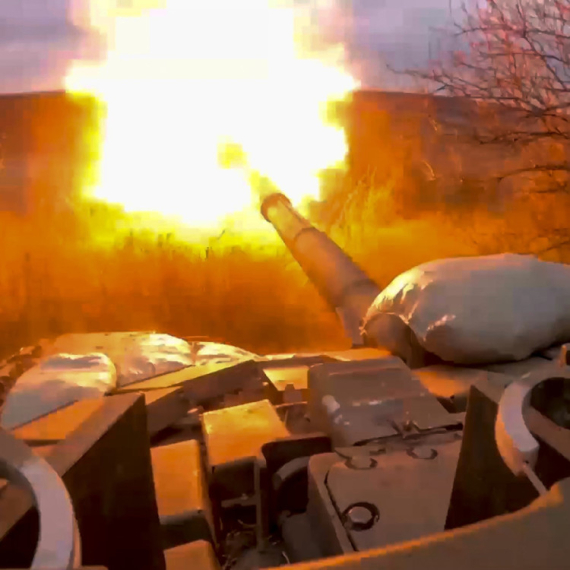
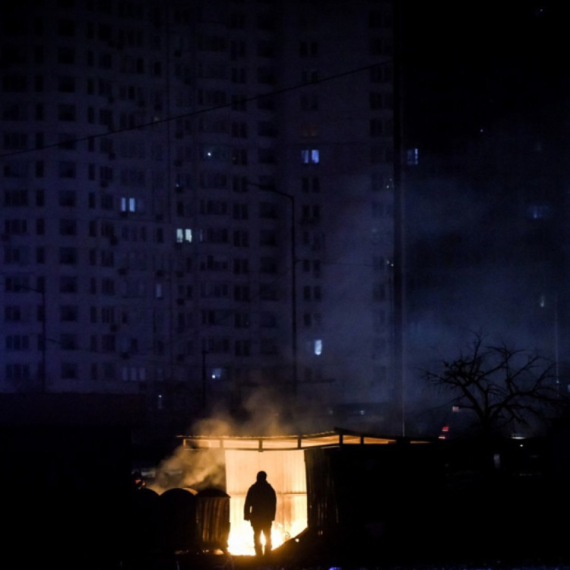

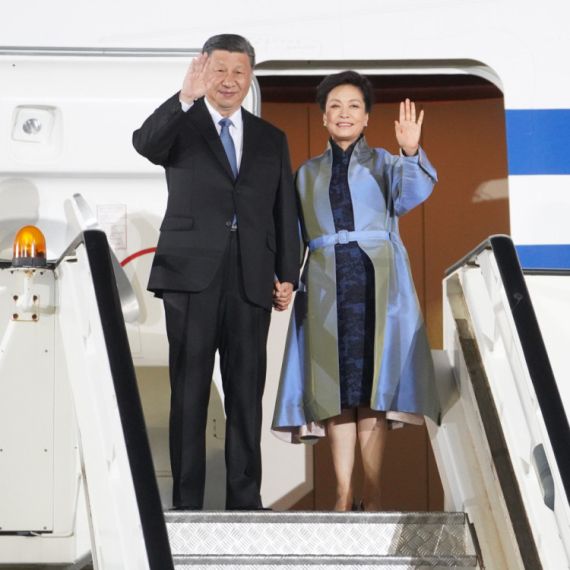



















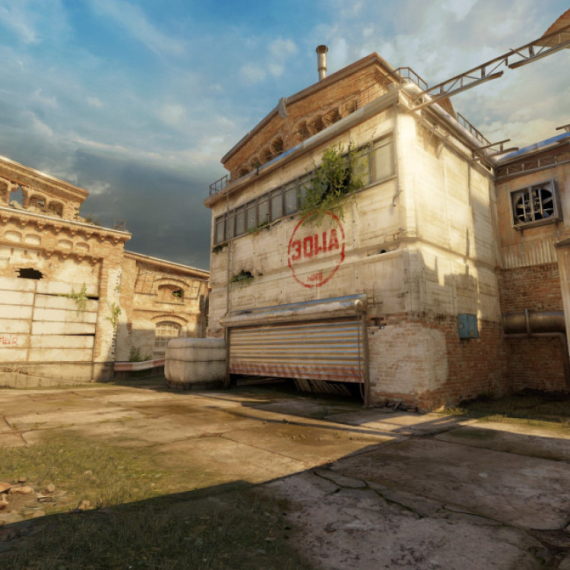




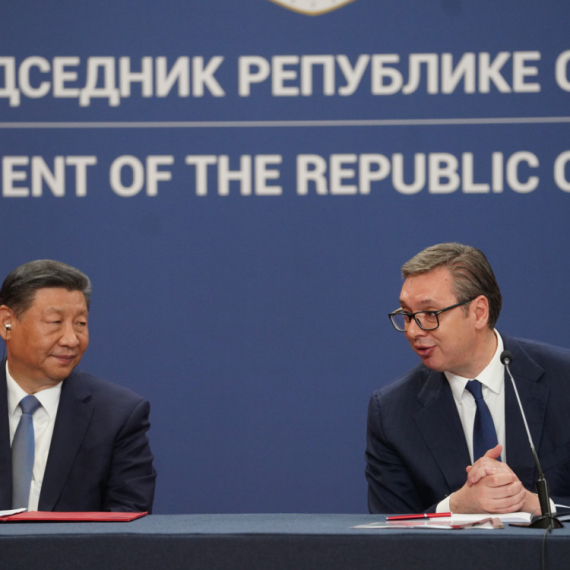

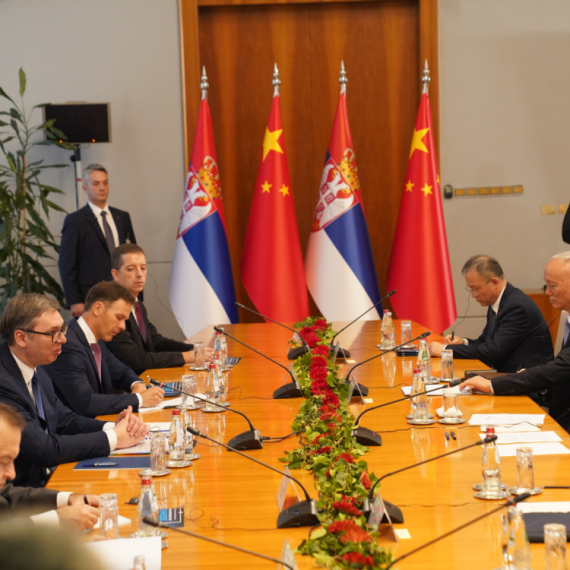
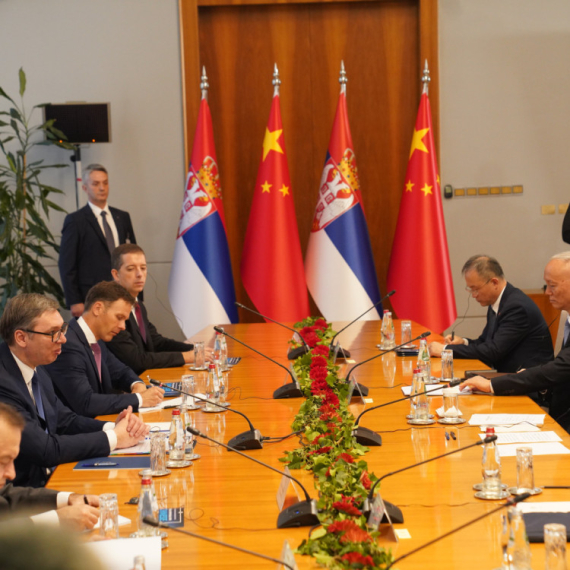
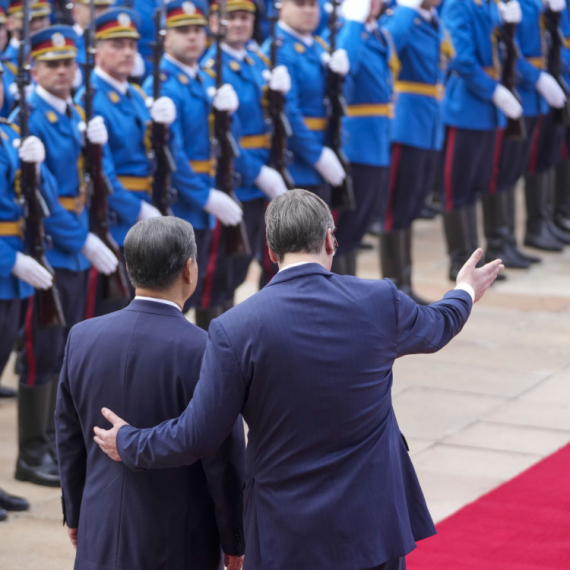













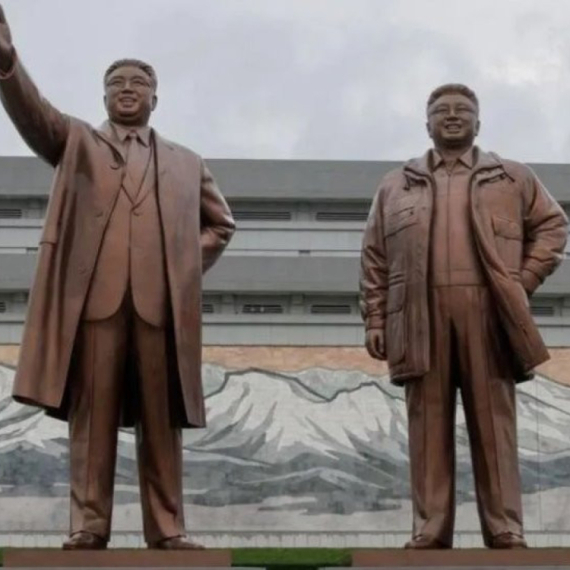
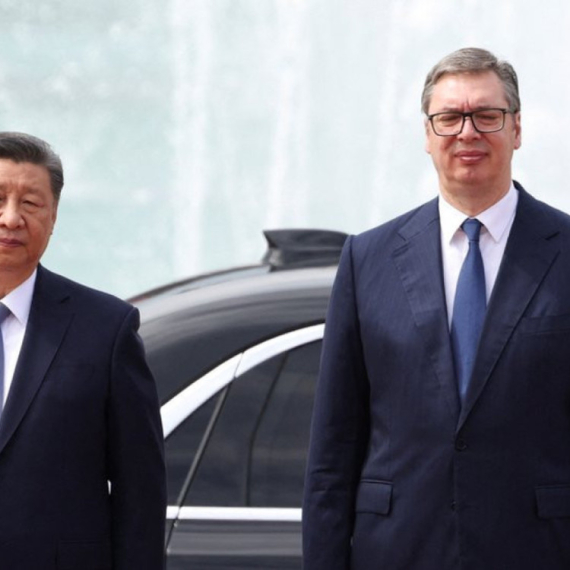

Komentari 15
Pogledaj komentare